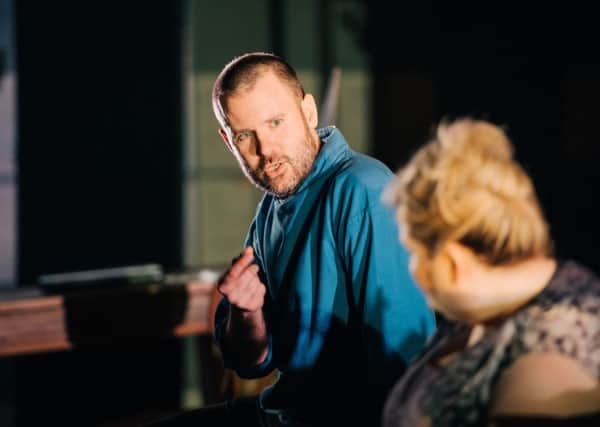Opera: Theatre director Matthew Lenton wants to put people in touch with their inner darkness


As a stage director, Matthew Lenton doesn’t like to be told what to do. Nor does he like to tell his audiences what to think. “I’m much more interested if someone doesn’t tell me what the meaning is; it’s what I love about art”, says the founder of experimental theatre company Vanishing Point, who is engaged in his first opera production with Scottish Opera.
So what should we expect from this intriguing double bill, which opens on Tuesday and couples Bartók’s one-act psychodrama Bluebeard’s Castle with a brand new music theatre piece, The 8th Door, by Scottish Opera resident composer Lliam Paterson, also featuring actors from Lenton’s Vanishing Point?
Advertisement
Hide AdAdvertisement
Hide Ad“Ambiguity”, for one thing. It’s why he feels so at home with this Bartók thriller as his operatic baptism. The grim Bluebeard (Robert Hayward) introduces his new wife Judith (Karen Cargill) to an imposing and mysterious castle dominated by seven locked doors, behind which lurk horrifying insights to the real Bluebeard and the fateful enigma of the final door. “It’s so full of questions, but depending on who you are, these questions may not be the same,” says the director.
Lenton wants his audience to relate these ambiguities to their own lives. “It’s very easy just to have Bluebeard as a monster in a castle who lures a young virgin, and for the audience to say, ‘that’s someone else’. I want them to say ‘this is about me’.”
In other words, don’t come to this production for a comfortable ride. Lenton firmly believes that everyone has their own darkness within and they won’t be escaping it in his theatre.
“I’m interested that somewhere in the audience there might be a serial killer, or someone who’s cheated on his wife, or a wife who’d cheated on her husband,” he explains. “Also in how the secret manifests itself in the consciousness, and in terms of guilt, the secrets that you live with, those you keep from other people, and the idea of wanting – or not wanting – to know the secrets of the person you live with. Is it possible to shed light on every corner of someone’s psyche? If so, would you want to? And would that person then remain interesting to you? All of that is what interests me most about Bluebeard’s Castle.”
Probing dark corners has been central to Lenton’s theatre work with Vanishing Point, in his award-winning 2009 Maeterlinck-inspired production Interiors, for instance, where torrid lies and secrets emerge during a cosy dinner party. He relates his creative style, and that all-important audience engagement, to viewing a Caravaggio in an art gallery.
“You’re not trying to work out simply what Caravaggio is telling you. You’re trying to imagine what would happen if it came to life. What’s in the darkness in Caravaggio? What can’t you see? All these things for me are rich and fertile ground,” he says.
So what does he want us to see behind the doors in Bluebeard? “Bartók symbolises a human relationship by placing these physical doors in the original opera,” he argues. “So there are doors in my production, but they’re not literal.” Each time one is opened, he says, “is like an interruption or event that penetrates or deteriorates the environment. Bartók talks of doors opening and different qualities of light behind them. For me, it’s like when you drop ink in water. You can never take it out again. It’s going to be part of your life.”
Advertisement
Hide AdAdvertisement
Hide AdDoes Lenton now see opera remaining part of his? “It’s been a wonderful experience, realising how music and singing can really transcend something other art forms can’t,” he says. “Sure, I was nervous on the first day, watching Siân Edwards pick up her baton, and me feeling like a kid in a sweet shop. I’d heard these nightmare stories about conductors falling out with directors, then scuppering each other. There was none of that. The relationship with Siân and the cast has been wonderful. I’ve followed my vision and they’ve committed to that. So yes, I think I’d like to do more opera.”
As for Paterson’s specially-composed partner piece, The 8th Door, Lenton has structured it using a small international pool of his own actors, and a text of Hungarian poems translated by Edwin Morgan, as complementary to the Bartók. “I became interested in the idea that The 8th Door represented the surface relationship of a man and a woman, while Bluebeard’s Castle delves into their dirty, dark subconscious world,” he says.
Other than that, Lenton wants you to make of it what you will. ■
Bluebeard’s Castle and The 8th Door, Theatre Royal, Glasgow, 28 March until 1 April; then Edinburgh Festival Theatre, 5-8 April, www.scottishopera.org.uk